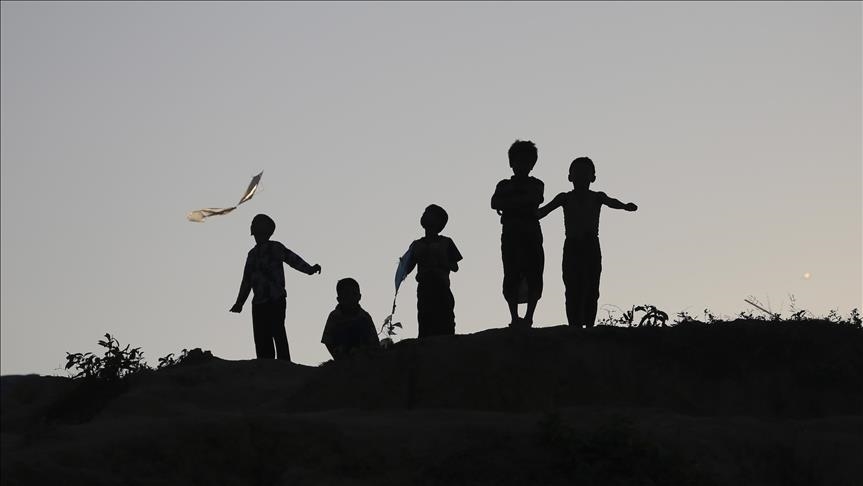UN's failure to put pressure on Myanmar cause delay in Rohingya repatriation: Experts
UN's failure to put pressure on Myanmar cause delay in Rohingya repatriation: Experts

DHAKA, Bangladesh
The UN’s failure to pressure Myanmar to take back its Rohingya nationals while providing them with humanitarian assistance on the remote Bangladeshi island of Bhasan Char may delay their much-awaited repatriation process, according to experts.
“We welcome the growing humanitarian assistance to the stateless Rohingya on Bhasan Char island by the UN, but its failure to compel Myanmar to engage in the repatriation process and develop a conducive environment inside the country will delay their dignified and peaceful repatriation,” Amena Mohsin, a professor of international relations at Dhaka University, told Anadolu Agency.
After a long debate, Bangladesh and the UN Refugee Agency (UNHCR) on Oct. 9, 2021, signed a memorandum of understanding on UN humanitarian services for Rohingya on the island in the southern Bay of Bengal.
Spending over US$350 million, the Bangladeshi government has constructed 1,400 big cluster houses and 120 multi-storied cyclone shelters with a 13-kilometer (8-mile) long flood control dam surrounding the island for temporarily relocating 100,000 Rohingya amid international concerns.
In multiple phases, the government has already shifted nearly 20,000 Rohingya there, though a few hundreds of them have fled the island at night through risky sea routes using fishing boats, worried about their future on the island and the uncertainty of repatriation.
The UN also opposed the relocation without a feasibility study being conducted on the silty island by experts.
“Until now, Bangladesh has not met the UN demand, and without addressing the risk factors properly, the UN agreement of being engaged at the island is not transparent to me,” Chowdhury Rafiqul Abrar, a human rights activist and former professor at Dhaka University, told Anadolu Agency.
Still have reservations
The island, which emerged from the ocean surface only 20 years ago and is located 50 kilometers (31 miles) off Bangladesh's southwestern coast and about 193 kilometers (120 miles) south of the capital Dhaka, is completely cut off from the mainland, with no means of providing assistance in the case of a natural disaster or adverse weather.
"I still have reservations about Bhasan Char," Abrar said, adding that the government must conduct a feasibility study to determine the island's habitability.
For a long-term solution to the Rohingya situation, Abrar further asked Bangladeshi authorities to use all diplomatic channels to persuade at least some countries, particularly India's closest neighbor, to jointly compel Myanmar to begin peaceful Rohingya repatriation.
“The international community must charge Myanmar for committing genocide against the Rohingya in Rakhine State and force the country to develop an internal environment for a meaningful repatriation. If the UN only emphasizes facilitating Rohingya in Bangladesh, the persecuted people will never be interested in going back to their home country amid the uncertainty,” he added.
Underlining the UN’s humanitarian response to the Rohingya as “interim measures,” Mohsin said it is also the responsibility of the international community “to make life for the Rohingya easy and tolerable” in Bangladesh.
Speaking to Anadolu Agency, a Rohingya community leader on Bhasan Char who requested anonymity said that regardless of the facilities provided and who is involved, they are stateless and have no future here.
“What are the prospects of our children with limited opportunities of primary level education? Maybe we will be more secure and enjoy more facilities after the UN presence, but without peaceful repatriation with rights, dignity, and safety, our next generation will lose their identity,” he said.
UN to prioritize repatriation
In a written response to the Anadolu Agency, the UNHCR spokesperson in Bangladesh, Regina de la Portilla, said the humanitarian response to the Rohingya on the island was a temporary solution and dignified and voluntary repatriation was their priority.
“While the refugees wait to return to Myanmar, UNHCR has the responsibility to protect Rohingya refugees wherever they may live. Therefore, the humanitarian response will extend to Bhasan Char, which should also be seen as a temporary solution, pending a voluntary and safe return to their home country,” Portilla said.
Referring to their wish, she added that Rohingya refugees had told them that they wanted nothing more than to return home again, “but they want to be sure that they and their families will be safe.”
For sustainable repatriation, the international community must ensure some factors, she said, adding that “ensuring the safe and sustainable return of Rohingya refugees in the future will require practical, concrete improvements in Myanmar, including lifting restrictions on freedom of movement and assuring the possibility to return to their own villages.”
She also emphasized solutions for internally-displaced Rohingya who have been living in camps within Myanmar for many years and issues like “providing a clear pathway towards citizenship and demonstrating a commitment to justice and accountability and a future where all peoples will enjoy basic rights and live in safety and security."
Anadolu Agency website contains only a portion of the news stories offered to subscribers in the AA News Broadcasting System (HAS), and in summarized form. Please contact us for subscription options.







